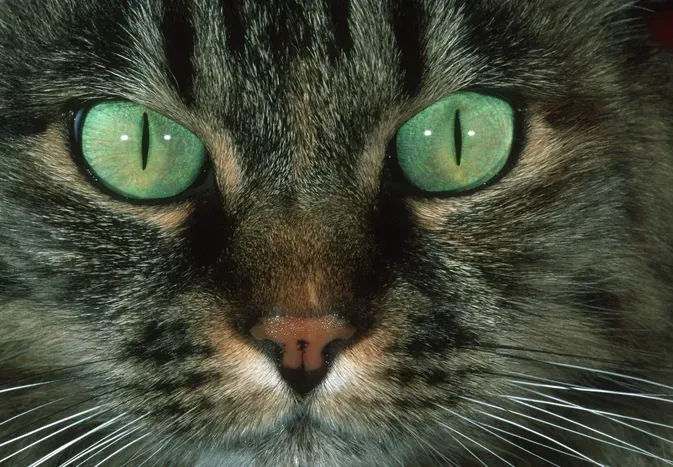Swollen Eyes in Cats
Updated on 04/26/24

Headline: Unraveling the Mystery of Swollen Eyes in Cats: A Comprehensive Guide
Introduction:
A feline's eyes are captivating windows into their world. However, when those eyes become swollen, it can be a source of distress for both the cat and its owner. Understanding the underlying causes and proper treatments is crucial for the well-being of your beloved companion. In this comprehensive guide, we delve into the complexities of swollen eyes in cats, empowering you with the knowledge necessary to alleviate discomfort and restore your feline's vision.
Causes of Swollen Eyes in Cats:
The spectrum of causes responsible for swollen eyes in cats is vast. Identifying the root cause is essential for effective treatment.
1. Allergies:
Allergies, induced by environmental triggers such as pollen, dust, or certain foods, can cause swelling and inflammation of the eyes. Symptoms may include redness, itching, and discharge.
2. Infections:
Bacterial and viral infections, such as conjunctivitis (pink eye) and herpesvirus, can lead to significant eye swelling. Discharge, squinting, and a dull appearance are common indicators.
3. Trauma:
Physical injuries to the eye, such as scratches or punctures, can result in swelling and pain. Excessive blinking, sensitivity to light, and a cloudy appearance may be present.
4. Corneal Ulcers:
Corneal ulcers, sores on the eye's surface, can cause severe swelling and discomfort. Symptoms include squinting, pawing at the eyes, and a hazy appearance.
5. Glaucoma:
Glaucoma, a condition characterized by increased intraocular pressure, can lead to swollen and painful eyes. Dilated pupils, excessive tearing, and a cloudy appearance are typical signs.
6. Eyelid Abnormalities:
Entropion (inward rolling of the eyelid) and ectropion (outward rolling of the eyelid) can cause irritation and swelling of the eye.
7. Cancer:
In rare cases, swollen eyes in cats may be associated with cancerous tumors in or around the eye.
Diagnosis:
Diagnosing the underlying cause of swollen eyes in cats requires a thorough veterinary examination. The veterinarian will perform a physical examination, assess the cat's medical history, and may recommend diagnostic tests such as eye stains, cultures, or imaging.
Treatment Options:
The treatment for swollen eyes in cats depends on the underlying cause.
1. Allergies:
Antihistamines and corticosteroids may be prescribed to reduce inflammation and discomfort. Identifying and eliminating the allergen is essential for long-term management.
2. Infections:
Antibiotic or antiviral medications are typically prescribed to combat infections. Regular eye cleaning and warm compresses can also aid in recovery.
3. Trauma:
Treatment may involve pain medication, antibiotics to prevent infection, and surgery in severe cases.
4. Corneal Ulcers:
Medications, such as antibiotics and pain relievers, are usually prescribed. In some cases, surgery may be necessary to repair the ulcer.
5. Glaucoma:
Treatment typically involves eye drops to reduce intraocular pressure. In severe cases, surgery may be required to improve drainage.
6. Eyelid Abnormalities:
Surgery may be necessary to correct eyelid abnormalities and restore normal eye function.
7. Cancer:
Treatment options depend on the type and stage of cancer. Surgery, radiation therapy, or chemotherapy may be employed.
Prevention:
While not all causes of swollen eyes in cats can be prevented, certain measures can reduce the risk:
* Regular veterinary checkups
* Vaccinations to protect against infections
* Proper nutrition and hydration
* Protection from environmental hazards
* Prompt treatment of any eye-related issues
Conclusion:
Swollen eyes in cats can be a concerning symptom, but understanding the underlying causes and treatment options empowers you to provide the best care for your feline companion. By recognizing the signs, seeking veterinary attention promptly, and adhering to the prescribed treatment plan, you can minimize discomfort, preserve your cat's vision, and ensure their overall well-being. Remember, the eyes are the windows to their world; let's keep them healthy and bright.
Explore More Pets

Cat Behavior Problems
How to Stop Aggression in Kittens

Long-Haired Cat Breeds
Siberian Cat: Breed Profile, Characteristics, & Care

Cat Behavior Problems
How to Stop Kittens From Scratching and Biting

Long-Haired Cat Breeds
Turkish Angora: Cat Breed Profile, Characteristics & Care

Basic Training
How to Socialize Your Kitten

Short-Haired Cat Breeds
Cute Pictures & Facts About Calico Cats & Kittens

Litter Box Training
Training Your Kitten to Use the Litter Box

Long-Haired Cat Breeds
10 Fun Facts About White Cats